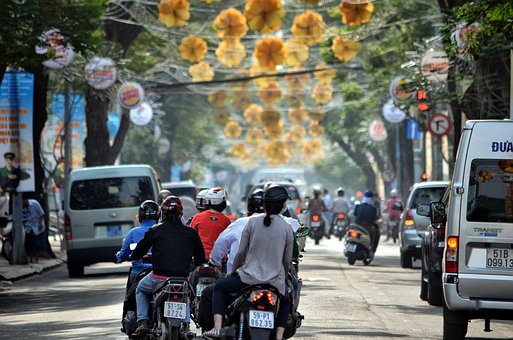Live In Vietnam
You may be like the many people who are looking to break out from their old routine and live somewhere new. Sometimes our lives get too mundane and you just need to branch out. Many Americans find themselves retreating to the comfortable tropics of Central America. Though the comfort of the beach may be enticing to some, others are looking for something different. Many Central American expat destinations promise North American living in the tropics. But if you’re really looking to shake up your lifestyle, maybe Asia is a better destination for you. More specifically, you should consider living overseas in Vietnam.
Vietnam offers a unique experience for visitors in an exciting way. Wherever you find yourself settling in, the country offers a different vibe. In Ho Chi Minh City, you will find a lot of digital nomads and entrepreneurs. In the northern city of Hanoi, you can find many teachers. There are also American expats who fought in the war sprinkled all over the country. There are an estimated 100,000 expats living overseas in Vietnam.
Some cultural advantages of moving to Vietnam include living among a different culture, learning a new language, and trying new food. Many describe the larger cities as having a laid back, yet busy feeling. The streets are busy with cars and motorbikes, so it’s advised that foreigners stick to taxis or have a driver. The cost of living is also pretty attractive to expatriates. The country is generally safe, with low crime rates, giving you one less worry during your day-to-day experience.
If a brand new lifestyle is what you are looking for, Vietnam could be your new home. It’s important to know your options for visas and residency before entering. The visa process can be a bit complicated and there a lot of specifications to be aware of.
Visas
Some Western country citizens do not need a visa for the first 15 days, which isn’t a very long time, so most foreign visitors arrange for a visa.
One way to get a visa is through a Vietnamese embassy. For this process, you need to submit a passport that is valid for at least six months, an application form, a passport photo, and the fee that can be anywhere from $185-$240.
The other way to get a visa is through a visa approval letter. This option is usually cheaper and eliminates the need to send in a passport. Many visa agencies and hotels provide this service. They will need your basic information and you will receive an emailed letter certified by an immigration official. The letter costs between $10 and $25.
You will need to print the letter and present it at the immigration counter at the airport upon arrival in Vietnam. After filling out an application and a stamping fee of $135, you will be good to go. The fee is only payable in USD or Vietnamese Dong.
Most visas are only valid for a year and require holders to leave the country at least once every 90 days. The visa can’t be extended, either, so after you a year, you’ll need to return home and set up a new visa. For this reason, many people take short trips called “visa runs,” which allow them to set up a new visa, since there’s no requirements saying how long they must be out of the country.
Other visa options:
- Working Visas – For expatriates who work with Vietnamese Authority, a NGO, Foreign Trader, or a Vietnam-based company (1 year)
- Professional Visas – This includes investors (5 years) and foreign journalists (1 year)
- Study or internship (1 year)
- Convention or conference (3 months)
- Visiting relatives (6 months)
Permanent Residency
The permanent residency card (PRC) is the best option for those who decide they’d like to live overseas in Vietnam. The residency options are limited, however, and it can sometimes be tricky to qualify for them.
There are three categories in which a person must fit into in order to obtain a PRC:
Experience the Insider community that takes your international lifestyle to the next level. Download your FREE guide
"18 Steps to Implementing Your Plan B" instantly!
- Fighting for the freedom and independence of the Vietnamese race, for socialism, for democracy and peace, and for science
- Person with distinguished services contributing to the work of building and protecting the Vietnamese Fatherland
- Spouse, child, or parent of a Vietnamese citizen residing permanently in Vietnam.
After filling out the proper application, it will take six months for the Immigration Department to communicate with the proper agencies to conduct examinations, verifications, and reports. There is also a $100 processing fee.
The PRC is valid for three years, after which you must renew the card in order to continue living overseas in Vietnam.
Here is probably the most extensive ebook on Everything You Ever Wanted To Know About Eliminating Your Taxes, Protecting Your Assets And Regaining Privacy Over Your Life And Investments. It is called The Ultimate Guide To Going Offshore. Visit our bookstore to purchase it today!
I hope you enjoyed reading this article: Live in Vietnam. If you have any questions, please contact our office HERE.
I’ve included some great articles for you to read, enjoy!
11 Things to Know Before You Visit Vietnam
10 Things Expats Should Know About Healthcare in Vietnam
Like Our Articles?
Then make sure to check out our Bookstore... we have titles packed full of premium offshore intel. Instant Download - Print off for your private library before the government demands we take these down!







